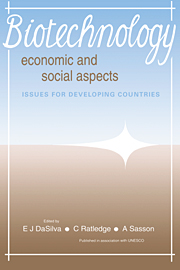Book contents
- Frontmatter
- Contents
- List of contributors
- Preface
- 1 Biotechnology: the socio-economic revolution? A synoptic view of the world status of biotechnology
- 2 Bioethanol production: economic and social considerations in failures and successes
- 3 Biofertilizers: agronomic and environmental impacts and economics
- 4 Microalgal biotechnology: is it an economic success?
- 5 Production of useful biochemicals by higher-plant cell cultures: biotechnological and economic aspects
- 6 Mushroom production – an economic measure in maintenance of food security
- 7 The economic viability of Single Cell Protein (SCP) production in the twenty-first century
- 8 The impact of biotechnology on international commodity trade
- 9 Biotechnology: socio-economic considerations, intercultural perspectives and international viewpoints
- 10 Joint microbial biotechnological ventures in developing countries: social promises and economic considerations
- 11 The economic and social implications of gene technology to developing countries
- 12 Making biotechnology appropriate – and environmentally sound
- 13 Information support for research and development in biotechnological applications
- 14 The effects of emerging biotechnologies on plant and animal agriculture – a viewpoint
- Index
10 - Joint microbial biotechnological ventures in developing countries: social promises and economic considerations
Published online by Cambridge University Press: 04 August 2010
- Frontmatter
- Contents
- List of contributors
- Preface
- 1 Biotechnology: the socio-economic revolution? A synoptic view of the world status of biotechnology
- 2 Bioethanol production: economic and social considerations in failures and successes
- 3 Biofertilizers: agronomic and environmental impacts and economics
- 4 Microalgal biotechnology: is it an economic success?
- 5 Production of useful biochemicals by higher-plant cell cultures: biotechnological and economic aspects
- 6 Mushroom production – an economic measure in maintenance of food security
- 7 The economic viability of Single Cell Protein (SCP) production in the twenty-first century
- 8 The impact of biotechnology on international commodity trade
- 9 Biotechnology: socio-economic considerations, intercultural perspectives and international viewpoints
- 10 Joint microbial biotechnological ventures in developing countries: social promises and economic considerations
- 11 The economic and social implications of gene technology to developing countries
- 12 Making biotechnology appropriate – and environmentally sound
- 13 Information support for research and development in biotechnological applications
- 14 The effects of emerging biotechnologies on plant and animal agriculture – a viewpoint
- Index
Summary
Introduction
Biotechnology today is a frontier area offering a new technological basis for the provision of solutions to the problems of all countries, whether they consider themselves to be in the developed or still in the developing stage. The ever-increasing urbanization, pollution in the air (the socalled greenhouse effect) and of waterways, de-forestation and other ecological destructions call for drastic action and industrial re-thinking (Doelle, 1989b).
Biotechnology, in particular the applications of microbiology, can make a significant and immediate contribution to the socio-cultural, economic and technological aspects to the development of the developing countries with applications in both developing and developed countries. There is no doubt that the application of microbiology, and thus the newly developing areas in biotechnology, are regarded as the most recent major technological (DaSilva, 1986) or socio-economical revolution (Doelle, 1989a) following the industrial and green revolutions.
In the fields of energy, animal feed, food production, aquaculture and pharmacy, the production of biofuels and chemical feedstocks, Single Cell Protein and microbial biomass products together with the development of nitrogen-fixing bacteria, bioinsecticides, biocatalysts and other living systems are considered important indices of already fast-growing biotechnologies (OECD, 1979).
As commercial biotechnology grows in the USA, for example, state governments are perceiving this new industry as an important component of economic development (Blakeley & Nishikawa, 1989). This survey further indicated that the individual states operate almost as separate nations in pursuing their own economic strategies to improve their own economic position. It is therefore of interest to realize that biotechnological efforts are directed depending upon the existing industrial, educational and resources base as well as the philosophy concerning the role of state government.
- Type
- Chapter
- Information
- Biotechnology: Economic and Social AspectsIssues for Developing Countries, pp. 235 - 265Publisher: Cambridge University PressPrint publication year: 1992
- 1
- Cited by

